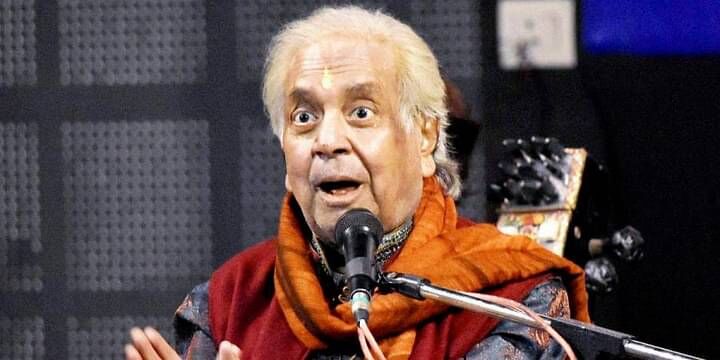Birju Maharaj: A life dedicated to dance and pursuit of classical excellence

He romanced Kathak like few others ever did, his mastery over the classical dance form writing him into lasting fame as one of India's greatest performing artistes.
Birju Maharaj lived as he died. He grew up with the ghungroo, tabla and harmonium striking rhythms of harmony and as took his last breath in the early hours of Monday his home was quite fittingly alive with the sound of music this time old songs he so loved.
The legendary dancer, a guru in the traditional sense who not just took Kathak to the world but also passed on his craft to generations of students, would have been 84 on February 4.
He was the consummate artiste, a poet, writing under the pen-name 'Brijshyam', a vocalist who had mastered thumri and other forms too, and also an instrumentalist. But it was Kathak, which became his calling in life. He dedicated every waking minute to finetuning and popularising the craft in India and beyond its shores.
It was those early growing up years at his ancestral home in Lucknow that gradually moulded the young Mishra into Birju Maharaj, the leader of Lucknow's Kalka-Bindadin Gharana.
It was like a sea of rhythm
and beat, and for seven generations that was the only topic
of discussion back home. Laya, swar, taal, bhangima, saundarya, aur nritya that was all we
talked about.
All we heard was the sound of ghunghru, tabla, and harmonium. Everybody would start practising at 4 in the morning, I would also get there with some sweets in my pocket. Sometimes I would try my hand at a tabla or a harmonium, had started learning bit by bit from the very beginning, he said in an interview.
Born in the house of Kathak exponent Jagannath Maharaj, better known as Acchan Maharaj, Birju Maharaj started performing from the age of seven.He was trained under his father and guru Acchan Maharaj and uncles Shambhu Maharaj and Lachhu Maharaj.
He began as a young child by accompanying his father to places such as Kanpur, Allahabad and Gorakhpur and then on to far off places, including Kolkata and Mumbai, where he shared the stage with him.
And then tragedy struck.
His father died and the young Birju Maharaj moved to Delhi and started teaching Kathak at the Sangeet Bharti to support his family. He was just 13 at the time.
He also taught at the Bharatiya Kala Kendra in Delhi, and at the Kathak Kendra (a unit of the Sangeet Natak Akademi) where he was head of faculty and director, retiring in 1998.
Birju Maharaj later opened his own dance school, Kalashram, also in Delhi.
His fame grew over the years. Soon, there came a time when Kathak, a form of dance that uses expressions and fluid movements to tell a 'katha' meaning 'story', became synonymous with Birju Maharaj.
Birju Maharaj went on to choreograph pieces like 'Makhan Chori' and 'Phaag Bahar'. Even when he was in his 70s, he worked on full-length mythological and historical dance-dramas, including 'Katha Raghunath Ki', 'Krishnayan' as well as 'Darbar-e-Salaami', 'Shaahi Mehfil'.
In his last years, he moved to abstract and rhythmic compositions such as 'Laya Parikrama', 'Naad Gunjan' and 'Ghunghru Sangeet'.
And then there were some great film moments too.
In Satyajit Ray's masterpiece 'Shatraj Ke Khiladi' in 1977, Birju Maharaj composed a dance, performed by a disciple, and sang the memorable 'Kanha main tose haari'. In a bit of interesting film history, the song was written by Bindadin Maharaj, Birju Maharaj's grandfather's brother who was a dancer and thumri exponent in the court of Nawab Wajid Ali Shah.
The two brothers went on to establish the Kakla-Bindadin Lucknow Gharana.
Birju Maharaj also trained Madhuri Dixit for the Devdas song 'Kaahe chhede mohe' and Deepika Padukone for her song 'Mohe rang do laal' in 'Bajirao Mastani'.
As one of India's most recognised names in the classical firmament, the awards were many, including the Padma Vibhushan, Sangeet Natak Akademi, Kalidas Samman, Nritya Vilas, Rajiv Gandhi Peace Award as well as a National Film Award for choreography in 'Vishwaroopam' and a Filmfare Award for 'Bajirao Mastani'.
Some bits of his life will be forever interwoven in history.



